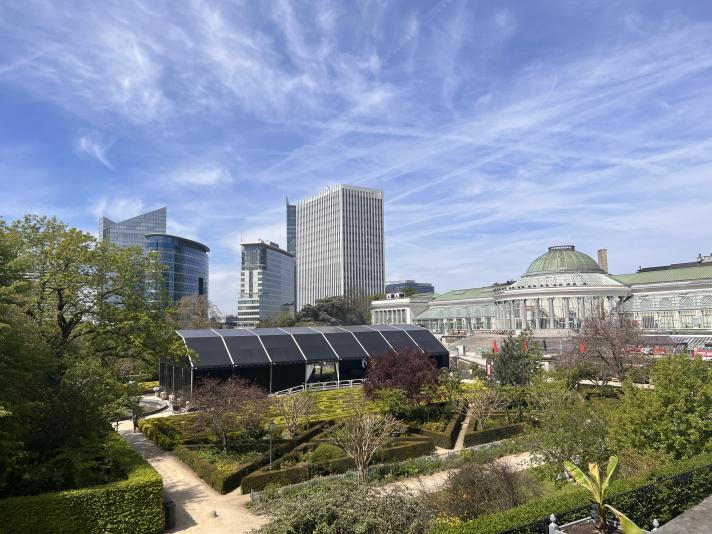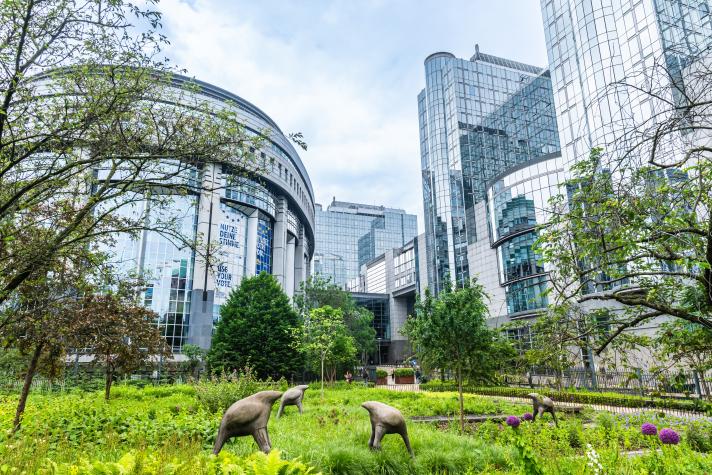A destination committed to green growth
Brussels puts sustainability at the heart of its tourism strategy. A strong advocate of environmental protection, the city is an active participant in the Global Destination Sustainability (GDS) movement, demonstrating its commitment to accountability and continuous improvement. Brussels is also committed to promoting sustainable tourism practices among local businesses, including certification programmes and initiatives such as Label Week, which raise awareness of sustainability standards.
The city’s Urban Green Network includes iconic places such as the Promenade Verte, a 60-km route through unspoilt natural landscapes and historic buildings, while the ambitious Good Move 2020-2030 regional mobility plan is a shining example of Brussels’ forward-thinking approach. These initiatives not only promote environmentally friendly transportation, but also create more green spaces, improving air quality and quality of life for residents and visitors alike.
Brussels is also actively trying to reduce tourism seasonality by hosting events throughout the year, ensuring that the benefits of tourism are spread across the seasons. The decision to involve residents through neighbourhood consultations and co-creation initiatives, such as the European Quarter brand, highlights Brussels’ collaborative spirit in sustainable tourism development.
Embracing technology
Brussels is at the forefront of integrating digital technology into its tourism offer, enhancing the visitor experience through innovative solutions. The city's visit.brussels platform exemplifies its commitment to digital accessibility, offering a responsive design that caters to all types of visitors. The FLOYA app, a cutting-edge mobility solution, further enhances the visitor experience by integrating all city mobility services, making it easier for tourists to explore Brussels in a sustainable way.
The forward-thinking approach to smart tourism is also evident in its data-driven decision-making process. The city’s Tourism Observatory centralises tourism data, allowing for informed planning and development. This focus on data transparency ensures that all stakeholders have access to valuable insights that drive sustainable and inclusive growth in the tourism sector.
A fusion of tradition and modernity
Brussels takes great pride in its cultural heritage, with 11 sites inscribed on the UNESCO World Heritage List, including the city's famous Art Nouveau architecture. The centenary of the Garden Cities, institutions such as urban.brussels and events such as Archiweek, ARTONOV, and the Urban Archaeology Days underline the city's committment to celebrating and preserving its cultural identity while embracing contemporary creativity.
The city’s cultural initiatives also make clever use of technology, from immersive exhibitions such as the Bright Festival to the Belgian Beer World. Brussels leverages its digital ecosystem to create personalised visitor experiences, aligning with modern tourism trends. The city also ensures that cultural participation is spread across its various districts, fostering a sense of community and inclusivity.
Making Brussels accessible to all
The destination is committed to ensuring that its tourism offer is inclusive and accessible to all. The city's extensive transport network, including real-time apps and contactless payment options, makes it easier for visitors with different needs to get around. The multilingual 'visit.brussels' website offers valuable accessibility features, providing information for people with disabilities and the LGBTQIA+ community.
In partnership with organisations such as Access-i and equal.brussels, Brussels continues to expand its accessibility initiatives, from tactile walking surfaces and low-floor public transport to AI-powered museum translations available in multiple languages. These efforts demonstrate Brussels' commitment to making the city a welcoming destination for everyone.


